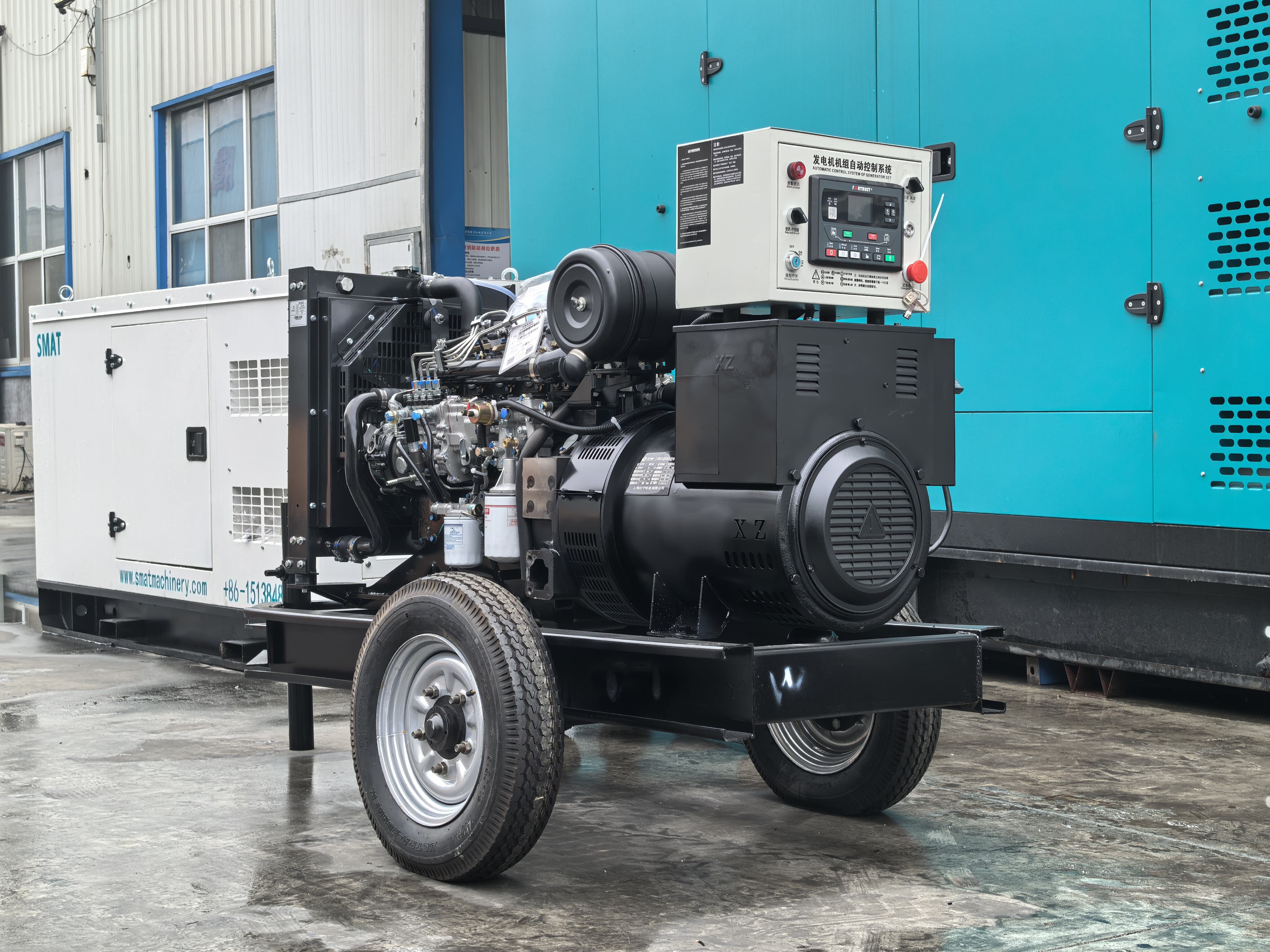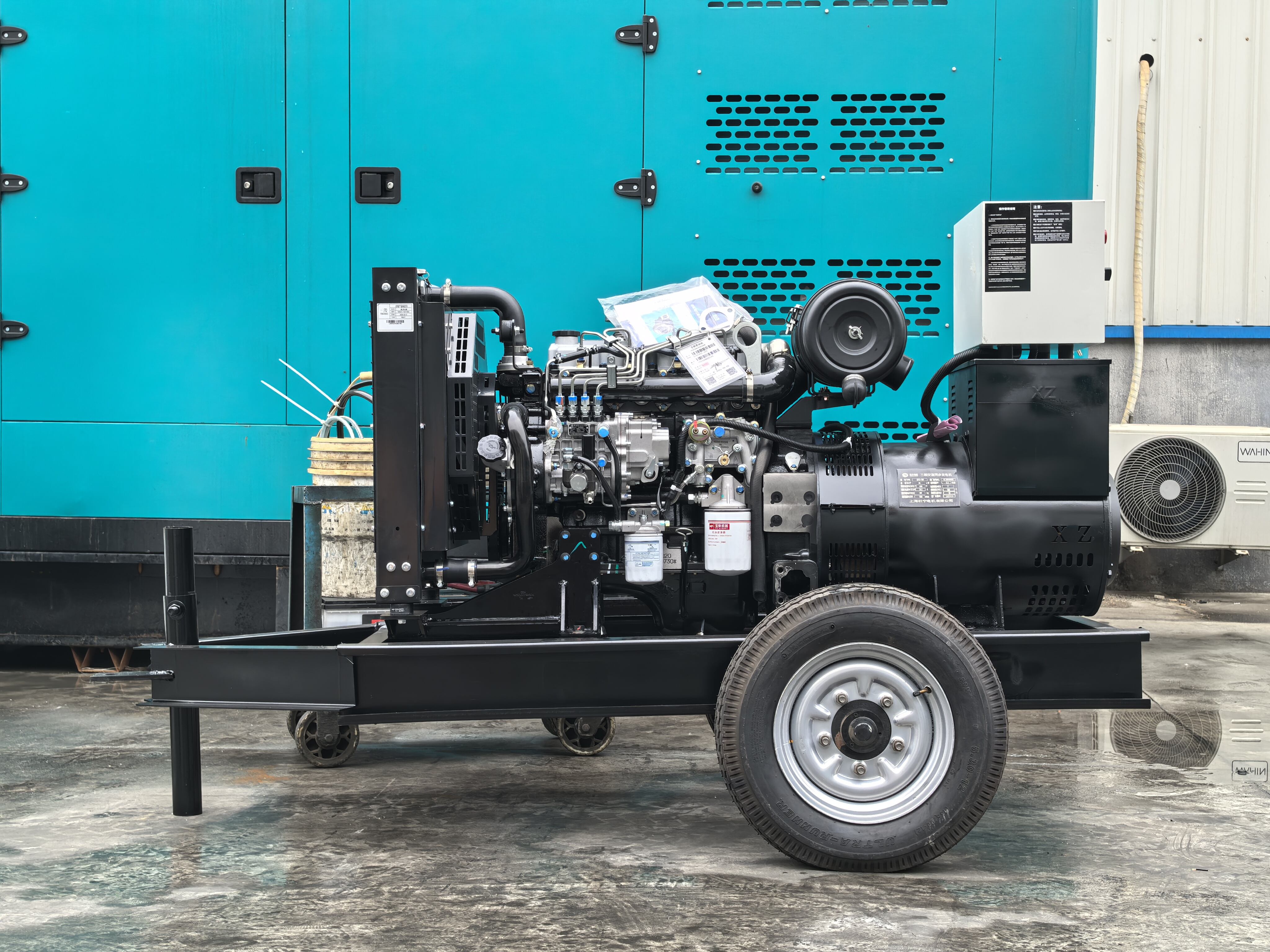Hoe Brandstofdoeltreffend Is Klein Dieselgenerators In Vergelyking Met Ander Kragbronne?
Wanneer dit kom by draagbare en back-up krag, klein dieselgenerators het al vir dekades 'n vertroude oplossing gebly. Hul reputasie vir duursaamheid, bestendige werkverrigting en lae brandstofverbruik in uitdagende omgewings maak hulle 'n sterk kandidaat teen ander kragbronne. Tog, met die toenemende gewildheid van alternatiewe soos petrolgenerators, sonskakelstelsels en hibriedoplossings, kom 'n vraag dikwels voor: hoe brandstofdoeltreffend is klein dieselenenerators in vergelyking met hierdie ander opsies?
In hierdie artikel sal ons die brandstofdoeltreffendheid van klein dieselgenerators ondersoek, hul voordele, beperkings en hoe hulle presteer in vergelyking met ander tegnologieë in werklike toepassings.
Verstaan van die Konsep van Brandstofdoeltreffendheid in Kragopwekking
Brandstofdoeltreffendheid in kragopwekking verwys na hoe effektief 'n generator die energie-inhoud van brandstof omset na bruikbare elektriese krag. Hoe meer kilowatt-uur (kWh) elektrisiteit 'n sisteem per liter of gallon brandstof kan produseer, hoe doeltreffender is dit. Vir klein dieselgenerators word hierdie doeltreffendheid beïnvloed deur faktore soos enjinontwerp, lasvermoë, instandhouding en bedryfsomstandighede.
Doeltreffendheid is nie net 'n kwessie van brandstofbesparing nie, maar dit beïnvloed ook langtermyn bedryfskoste en omgewingsvolhoubaarheid. 'n Hoogs doeltreffende generator verminder brandstofkoste en minimeer emissies, wat dit aantreklik maak vir beide residensiële en industriële gebruikers.
Hoekom Klein Dieselgenerators as Doeltreffend Beskou Word
Klein dieselgenerators het 'n reputasie vir uitstekende brandstofekonomie verwerf. In teenstelling met petrolmotore, werk dieselmotore met hoër kompressieverhoudings en gebruik hulle direkte brandstofinspuiting, wat dit vir hulle moontlik maak om meer energie per eenheid brandstof te onttrek. Dit beteken dat selfs kompakte modelle oor lang tydperke heen gestadige krag kan lewer sonder om te veel brandstof te verbruik.
'n Ander voordeel is dat dieselbrandstof self meer energie per liter bevat in vergelyking met petrol. Hierdie hoër energiedigtheid laat klein dieselgenerators toe om langer te loop en meer krag te genereer uit dieselfde volume brandstof.
Hul doeltreffendheid word veral opvallend wanneer dit onder gestadige lasse loop, wat dit ideaal maak vir toepassings waar gestadige elektrisiteit benodig word, soos op boupersele, klein sakeondernemings of as rugsteun vir residensiële huise.
Vergelyking van Klein Dieselgenerators met Petrolgenerators
Bensien-genereerders word dikwels as die goedkoop en draagbare opsie beskou. Kleindieselgenereerders oortref hulle egter wanneer dit kom by brandstofdoeltreffendheid.
ʼN Kleindieselgenereerder verbruik gewoonlik 30% tot 50% minder brandstof as ʼn vergelykbare bensienmodel wanneer dit dieselfde hoeveelheid krag produseer. Hierdie verskil word aansienlik in situasies waar die genereerder vir lang ure moet loop, soos in afgeleë gebiede of gebiede wat aanhoudend aan kragonderbrekings blootgestel is.
Bensien brand ook vinniger en produseer meer emissies in vergelyking met dieselbrandstof, wat beteken dat die bedryfskoste oor die algemeen hoër is met bensiengenereerders. Terwyl die aanvanklike aankooppryse vir bensien-genereerders laer is, weeg die langtermyn brandstofbesparing van dieselgenereerders dikwels hierdie verskil op.
Kleindieselgenereerders teenoor Solerenergiestelsels
Die opkoms van hernubare energie het solstelsels 'n aantreklike opsie gemaak vir huisbaas en besighede wat op soek is na volhoubare kragoplossings. In teenstelling met klein dieselgenerators, verbruik solkrag glad geen brandstof nie, wat dit die mees effektief maak wat betref hulpbronverbruik. Solkrag het egter beperkings wat dieselgenerators oorkom.
Solstelsels is afhanklik van die beskikbaarheid van sonlig, wat beteken dat dit nie bestendige energie kan verskaf tydens bewolkte weer, snags, of in streke met lae sonblootstelling nie. Om dit te oorkom, vereis solinstallasies duur batteryopslagstelsels, wat die algehele koste en kompleksiteit verhoog.
In teenstelling kan klein dieselgenerators bestendige krag lewer ongeag die omgewingsomstandighede, wat dit betroubaar maak in noodgevalle of af-grid scenarios waar solkrag kan misluk. Vanuit 'n suiwer brandstofeffektiwiteit-oogpunt, lei solkrag, maar wat betroubaarheid betref, bly diesel 'n betroubare rugsteun.
Vergelyking van Klein Dieselgenerators met Aardgasgenerators
Aardgasgenereerders het gewild geraak weens hul skoonder emissies en stabiele brandstofvoorsiening in stedelike gebiede. In terme van brandstofdoeltreffendheid is aardgasgenereerders mededingend, maar hulle kom dikwels agter by diesel in draagbare of klein-skaal toepassings.
Aardgas het 'n laer energiedigtheid in vergelyking met dieselbrandstof, wat beteken dat meer volume benodig word om dieselfde hoeveelheid elektrisiteit te produseer. Wanneer dit egter aan 'n deurlopende gaslyn gekoppel word, kan aardgasgenereerders langer werksaam wees sonder dat dit herlaai moet word.
Nogtans, in terme van draagbaarheid en energie-uitset per eenheid brandstof, is klein dieselgenereerders gewoonlik meer doeltreffend. Vir losstaande of mobiele toepassings bly diesel die beter keuse.
Hibriede stelsels en die rol van klein dieselgenereerders
Hibried kragstelsels wat hernubare energie (soos son- of windenergie) met klein dieselgenerators kombineer, word toenemend algemeen. In hierdie opstel is die generator 'n rugsteun om die kragvoorsiening te verseker wanneer hernubare bronne nie beskikbaar is nie.
Hierdie benadering maksimeer doeltreffendheid deur dieselverbruik te verminder terwyl betroubaarheid behou word. Die generator tree slegs in werking wanneer dit nodig is, wat gebruikers in staat stel om volhoubare ontwikkeling met betroubare elektrisiteit te balanseer.
In sulke opstellings bly klein dieselgenerators onmisbaar as gevolg van hul doeltreffendheid, vermoë om skielike lasveranderinge te hanteer en hul lang bedryfslewe.
Regte-toepassings van klein dieselgenerators
Om hul doeltreffendheid beter te verstaan, is dit nuttig om te kyk hoe klein dieselgenerators in verskillende sektore toegepas word.
In woonstelle word dit dikwels as back-upkrag gebruik vir yskaste, verwarmingstelsels en noodsaaklike toestelle tydens kragonderbrekings. Hul brandstofdoeltreffendheid verseker dat huishoudings krag kan behou sonder oormatige brandstofkoste.
Op konstruksiepersele verskaf klein dieselgenerators bestendige krag vir gereedskap, beligting en toerusting. Hul doeltreffendheid laat toe dat werkers vir lang skofte kan werk sonder dat hulle dikwels moet brandstof byvoeg, wat afbreektyd verminder.
In afgeleë gebiede, soos plattelandse dorpe of mynbedrywe, dien klein dieselgenerators dikwels as die primêre bron van elektrisiteit. Hul vermoë om vir lang ure te werk met minimale brandstofverbruik maak dit ideaal vir buite-nettoestande.

Omgewingsoorwegings
Al is klein dieselgenerators brandstofdoeltreffend, bly hul uitstoot 'n kwessie. Dieselverbranding vrystel stikstofoksiede (NOx), partikelmaterie en koolstofdioxide, wat lugkwaliteit kan beïnvloed. Zelfs, het vooruitgang in enjin-tegnologie en skoonbrandende dieselbrandstowwe hierdie uitstoot aansienlik verminder.
In vergelyking met petrolgenerators, emiteer klein dieselgenerators steeds minder kweekhuisgasse per eenheid van krag wat gegenereer word, te danke aan hul groter doeltreffendheid. Daarbenewens is baie moderne eenhede ontwerp om te voldoen aan streng uitstootstandaarde, wat hulle 'n meer omgewingsverantwoordelike keuse maak.
Onderhoud en Duursaamheid: Versteekte Doeltreffendheidsfaktore
Brandstofdoeltreffendheid gaan nie net oor brandstofverbruik nie, maar ook oor hoe lank 'n generator duur voor vervanging nodig is. Klein dieselgenerators is bekend vir hul duursaamheid en lang dienslewens.
Dieselmotors loop gewoonlik koeler as petrolmotors en ervaar minder slijtage, wat bydra tot minder afbrekings en laer onderhoudskoste. Hierdie lang lewe beteken dat gebruikers gedurende die hele lewensiklus van die kragopwekker 'n groter doeltreffendheid geniet, wat dit 'n koste-effektiewe belegging maak.
Toekomstige tendense in klein dieselgenerators
Die vraag na doeltreffende en omgewingsvriendelike kragopwekkers dryf innovasies in die ontwerp van klein diesel kragopwekkers. Vervaardigers ondersoek hibriede modelle, gevorderde brandstofinspuitingsisteme en emissiesverminderingstegnologieë om hulle nog doeltreffender te maak.
Party eksperimenteer selfs met biobrandstof as alternatiewe vir tradisionele diesel, wat die volhoubaarheid verder kan verbeter sonder om die prestasie in gevaar te stel.
Namate hernubare energie aanhou groei, sal klein dieselgenerators waarskynlik 'n noodsaaklike deel van hibriede stelsels bly, wat betroubaarheid verseker terwyl die gebruik van fossielbrandstowwe tot 'n minimum verminder word.
Gevolgtrekking
Klein dieselgenerators is onder die mees brandstofdoeltreffende draagbare kragoplossings beskikbaar vandag. Hulle doen behoorlik beter as petrolgenerators, verskaf betroubaarheid wat sonkrag alleen nie kan waarborg nie, en lewer 'n beter energiedigtheid as natuurlike gas in draagbare toepassings.
Hul balans van doeltreffendheid, duursaamheid en betroubaarheid maak hulle 'n bevoorregte keuse vir huisbaas, besighede en nywers wat konstante krag by redelike brandstofkoste benodig. Terwyl hernubare energie opklim, bewys klein dieselgenerators steeds hul waarde in beide selfstandige en hibriede energiestelsels.
FAQ
Hoeveel brandstof verbruik 'n klein dieselgenerator per uur?
Gemiddeld verbruik 'n klein dieselgenerator tussen 0,3 en 0,5 liter brandstof per kilowattuur, afhangende van die las en enjin se doeltreffendheid.
Is klein dieselgenerators goedkoper om te bedryf as petrolgenerators?
Ja, klein dieselgenerators is oor die algemeen goedkoper om te bedryf omdat hulle minder brandstof verbruik en minder gereelde instandhouding vereis in vergelyking met petrolmodelle.
Kan klein dieselgenerators saam met hernubare energiestelsels gebruik word?
Absoluut. Hulle word dikwels in hibriedstelsels met son- of windkrag geïntegreer om steunkrag te verskaf wanneer hernubare bronne nie beskikbaar is nie.
Hoe lank kan 'n klein dieselgenerator hou?
Met die regte instandhouding kan klein dieselgenerators tussen 10 000 en 30 000 bedryfsure hou, wat aansienlik langer is as die meeste petrolgenerators.
Is klein dieselgenerators omgewingsvriendelik?
Al is hulle nie heeltemal emissievry nie, is klein dieselgenerators meer brandstofdoeltreffend en stoot hulle minder kweekhuisgasse per kilowatt-uur uit in vergelyking met petrolmodelle. Moderne ontwerpe voldoen ook aan strengere emissieregulasies.
Inhoudsopgawe
- Hoe Brandstofdoeltreffend Is Klein Dieselgenerators In Vergelyking Met Ander Kragbronne?
- Verstaan van die Konsep van Brandstofdoeltreffendheid in Kragopwekking
- Hoekom Klein Dieselgenerators as Doeltreffend Beskou Word
- Vergelyking van Klein Dieselgenerators met Petrolgenerators
- Kleindieselgenereerders teenoor Solerenergiestelsels
- Vergelyking van Klein Dieselgenerators met Aardgasgenerators
- Hibriede stelsels en die rol van klein dieselgenereerders
- Regte-toepassings van klein dieselgenerators
- Omgewingsoorwegings
- Onderhoud en Duursaamheid: Versteekte Doeltreffendheidsfaktore
- Toekomstige tendense in klein dieselgenerators
- Gevolgtrekking
- FAQ

